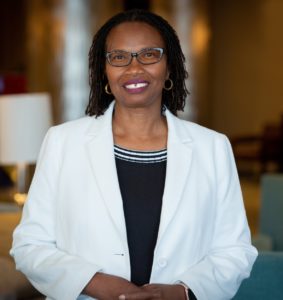BY PAT SMITH
Today, I’m holding two things in my heart.
The first is tremendous relief that a jury believed what our eyes knew from the start: That George Floyd was the victim of a heinous murder at the hands of a police officer.
The second is knowledge that this is a too-rare rebuke of police misconduct in a country where nearly 1,000 people die at the hands of law enforcement each year, with case after case of officers eluding justice after killing a Black person.
I hope that the verdict brings the Floyd family some measure of peace. And I will forever be filled with deep awe and gratitude for the countless people who took to the streets over the past year, invoking his name as a call to action and igniting a national reckoning on race.
But even though the trial is over, nothing is really over.
There is still so much more work to be done. We need to radically re-imagine our approach to law enforcement and to truly keep our communities safe. We have to dismantle racist systems and policies that create barriers to opportunities and cut lives short. We have to not only ensure that Black and brown bodies are physically safe, but that their voices — as well as those of all communities of color — are heard and their ballots counted.
Since testimony in the trial began on March 29, at least 64 people have died at the hands of law enforcement nationwide, with Black and Latinx people representing more than half of those killed, according to the New York Times. That includes Daunte Wright, a young Black man killed in Brooklyn Center, just a few miles from where Floyd’s murderer was standing trial in Minneapolis. It includes Adam Toledo, an unarmed 13-year-old boy gunned down in Chicago. That number does not include 16-year-old Ma’Khia Bryant, killed by a police officer in Columbus, Ohio, less than an hour after Derick Chauvin was found guilty.
So much grief. So much work to do.
For those who would like to explore policy recommendations that center equity and compassion, I recommend you start with PolicyLink’s “policing toolkit,” Building Momentum from the Ground Up: A Toolkit for Promoting Justice in Policing.
There has already been great work being done at the grassroots level, in Minneapolis and beyond. We encourage you and your grantmaking organizations to increase support of frontline organizations led by BIPOC members of our communities through general operating grants, and to truly partner with these groups as equals at the decision-making tables in the communities you serve.
This movement that spurred people to take to the streets and the ballot box this past year has, unsurprisingly, sparked pushback.
Here in Florida, home to TFN’s headquarters, a newly enacted law mandates harsh criminal penalties against protestors exercising their First Amendment rights. The law, signed into law by our governor on Monday, was a direct response to protests demanding police accountability and transparency, and seeks to silence and criminalize those who want to see justice for Black lives.
In Georgia, where voters elected their first Black U.S. senator in November, a controversial new voting law has been enacted to make it harder for people of color to vote. Discriminatory changes to voting laws in Arizona, Michigan, and Texas are also being considered.
Last week, more than 60 foundation leaders — including many members of The Funders Network — joined with corporate executives, scholars and others to protest these efforts to restrict voting rights.
Gerrymandering, which is wielded as a tool of voter suppression, is another obstacle to ensuring communities are fairly represented and adequately funded. To learn more about how funders can engage in the 2021-2022 redistricting cycle, and how it presents a “critical opportunity for communities to build power, ensure equitable political representation, and address systemic inequities,” please visit these resources from the Funders’ Committee for Civic Participation.
I also want to lift up the work of Rukia Lumumba, one of our recent TFN annual conference plenary speakers, and her colleagues whose work supports the Movement for Black Lives Electoral Justice Project.
There are so many activists, advocates and allies that have given me strength and inspiration in the 11 months since that video of George Floyd’s death shook the world.
We can’t let this moment slide into history, but continue to meet it head on with passion and purpose.
That means keeping our eyes always open to injustice, and our hearts always open to change.
About the Author
Pat Smith is the President and CEO of The Funders Network (TFN). TFN’s mission is to leverage philanthropy’s unique potential to help create communities and regions that are sustainable, prosperous, healthy and just for all people. TFN is committed to helping funders understand and address racism, economic inequality, and the imbalance of power — while engendering community-driven solutions and amplifying the expertise and experiences of those communities who are least heard. (To learn more about TFN’s foundational and cross-cutting commitment to racial equity, as well as resources for funders, visit our Putting Equity First page.)

